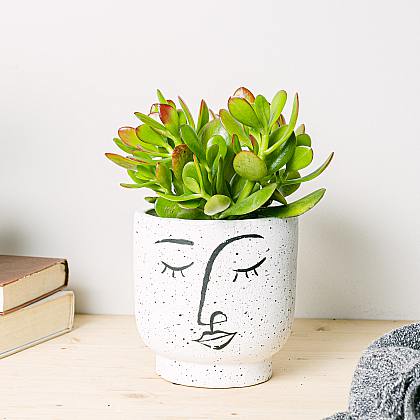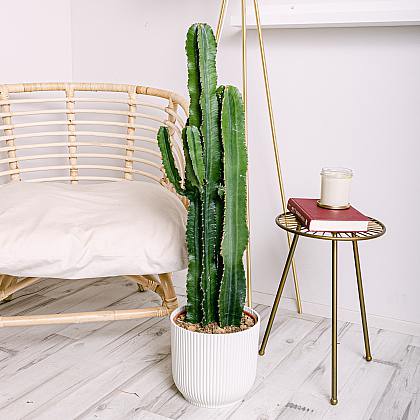The Green Power: Discover the plants that absorb non-ionizing radiation in your home
The Green Power: Discover the plants that absorb non-ionizing radiation in your home. Did you know that plants can do so much more than just decorate your home?...
The Green Power: Discover the plants that absorb non-ionizing radiation in your home. Did you know that plants can do so much more than just decorate your home? That's right! It turns out that some plants have the incredible power to filter out the non-ionizing radiation that surrounds us. But what is that radiation and how does it affect us? Do not worry! In this article, we'll explain everything you need to know about this topic and show you which are the most effective plants to purify your home environment. In addition, we will give you some tips on how to incorporate these plants into your home décor. Get ready to discover the added benefits of having plants at home and learn how to care for them so they continue to purify the air!
What is non-ionizing radiation and how does it affect us?
Non-ionizing radiation is a type of electromagnetic radiation found in our daily environment. Unlike ionizing radiation, such as X-rays or gamma rays, non-ionizing radiation does not have enough energy to ionize atoms or molecules. However, this doesn't mean that it can't affect us in some way.
Continuous exposure to non-ionizing radiation can have negative effects on our health. For example, radiation from mobile phones, cell towers, and wireless devices can penetrate our tissues and generate heat. In addition, some studies suggest that this radiation may have long-term biological effects, such as increasing the risk of cancer.
It is important to reduce our exposure to non-ionizing radiation as much as possible. An effective way to do this is to incorporate purifying plants into our home. These plants have the ability to absorb and filter electromagnetic radiation, thus helping to create a healthier environment.
By understanding what non-ionizing radiation is and how it affects us, we can take steps to protect ourselves and our families. Incorporating purifying plants into our home is a simple and natural way to reduce our exposure to this harmful radiation. Not only will we be taking care of our health, but we will also be enjoying the additional benefits that plants provide us, such as improving air quality and creating a more relaxing and welcoming environment.
The Importance of Reducing Exposure to Non-Ionizing Radiation
We live surrounded by technology and electronic devices that emit non-ionizing radiation, such as mobile phones, computers, and household appliances. Although this radiation is not as dangerous as ionizing radiation, which can cause cell damage and cancer, we still need to worry about reducing our exposure to it. Why? Because in the long term, non-ionizing radiation can have negative effects on our health. It can cause symptoms such as fatigue, headache, and insomnia. In addition, some studies suggest that it may affect the immune and hormonal systems. That's why it's important to take steps to decrease exposure to this radiation in our home. We can do this by turning off electronic devices when we're not using them, using headphones instead of holding the phone close to our head, and avoiding placing the WiFi router near areas where we spend a lot of time, such as the bedroom or desk. It is also advisable to limit the time we spend in front of screens and make sure we have good ventilation in our rooms so that air circulates and disperses electromagnetic radiation. In short, while we can't completely eliminate non-ionizing radiation in our environment, we can take simple steps to reduce our exposure and take care of our health.
Plants that act as natural filters for non-ionizing radiation
Non-ionizing radiation is something we should be more concerned about than we think. It is present in our homes, coming from electronic devices such as Wi-Fi, mobile phones, and home appliances. Fortunately, there are plants that act as natural filters for this radiation and can help us reduce our exposure to it. These plants absorb electromagnetic waves and convert them into energy that they use for their growth. Some of the most effective plants for filtering out non-ionizing radiation are jade cactus, sansevieria, and ficus benjamina. These plants not only purify the air, but also protect us from the negative effects of radiation. In addition, they add a touch of color and life to our home. We can place them near our electronic devices or in the rooms where we spend the most time. It's important to remember that these plants don't completely eliminate radiation, but they do help reduce it significantly. So, if you're concerned about non-ionizing radiation in your home, consider incorporating some of these plants into your décor. Not only will you be taking care of your health, but you'll also be creating a greener and more welcoming environment.
The Most Effective Plants to Purify Your Home Environment
Plants are great allies in purifying the environment of our home, and some are especially effective in absorbing non-ionizing radiation. Among the most prominent plants are potus, sansevieria, and Boston fern. These plants have the ability to filter and neutralize pollutants present in the air, including radiation from electronic devices such as mobile phones and computers. In addition to their purifying function, these plants add a natural and fresh touch to our interior decoration. Pothos is a hanging plant with glossy green leaves that easily adapts to different light conditions. Sansevieria, also known as mother-in-law's tongue, is a hardy plant that can survive in low-light environments. On the other hand, the Boston fern is a leafy plant that brings a lush and elegant look to any space. By incorporating these plants into our home, we can create a healthier and more balanced environment, reducing exposure to non-ionizing radiation and improving our quality of life. In addition, the care and maintenance of these plants is relatively simple, which makes them ideal options for those who have no previous gardening experience. So don't hesitate to give your home a touch of green and enjoy the benefits that these purifying plants can offer you.
How to incorporate these plants into your home décor
Once you've selected the right purifying plants for your home, it's important to know how to incorporate them into your décor in a harmonious and attractive way. Not only will these plants provide you with health benefits, but they can also be made into charming decorative elements. You can place them in ceramic pots or hangers, using different sizes and shapes to create an interesting visual effect. You can also choose to place them on shelves or shelves, along with other decorative objects such as books or paintings. Another option is to create small vertical gardens using wooden or metal structures, where you can hang several plants at different heights. Not only will this be pleasing to the eye, but it will also maximize the available space in your home. In addition, you can combine different types of purifying plants to create unique and lively compositions. Remember that these plants need natural light, so be sure to place them near windows or in well-lit spaces. Don't be afraid to experiment and play with the distribution of plants in your home, the idea is that you feel happy and connected to nature in your own space!
Additional Benefits of Having Plants at Home
Having plants at home not only helps purify the air from non-ionizing radiation, but it also has additional benefits that can improve our quality of life. These wonderful green companions provide us with a sense of calm and relaxation, creating a calm and welcoming atmosphere in our home. In addition, plants also have the ability to increase air humidity, which can be especially beneficial in dry climates or during the winter months when the air tends to be drier. This can help prevent respiratory problems and keep our skin hydrated.
Another benefit of having plants at home is that they can act as natural filters, removing toxins and chemicals present in the air. Some plants, such as pothos or peace lily, are known for their ability to absorb volatile organic compounds (VOCs), which are commonly found in cleaning products and building materials. In this way, having plants at home can help us create a healthier environment free of harmful substances.
In addition, plants can also improve our mood and reduce stress. Studies have shown that being surrounded by nature, even in the form of potted plants inside our home, can have a positive effect on our mental health. The presence of plants connects us to nature and helps us feel more connected to the world around us.
In short, having plants at home not only helps us purify the air from non-ionizing radiation, but also provides us with additional benefits such as a calm environment, increased humidity from the air, and the elimination of toxins. In addition, plants can improve our mood and reduce stress. So why not incorporate some purifying plants into your home décor? Your health and well-being will thank you.
Care and maintenance of purification plants
Purifying plants are an excellent option to improve the air quality in our home, but it is important to remember that they also need care and maintenance to stay healthy and effective in their task. To make sure that our plants are in optimal condition, we need to pay attention to several aspects. First of all, it is essential to provide them with the right amount of water. Each species has its own needs, so it's important to do your research and learn about the specific requirements of each plant. In addition, we must take into account the amount of sunlight they receive. Some purifying plants require indirect light or partial shade, while others prefer more direct sun exposure. We must also be aware of possible pests or diseases that may affect our plants. If we notice signs of infestation or disease, it's important to take quick action to prevent its spread and protect the health of our plants. Finally, we must not forget to fertilize our plants regularly to ensure healthy growth. By following these tips and dedicating a little time and attention to our purifying plants, we will be able to enjoy their benefits for a long time.
Plants have an amazing power to absorb non-ionizing radiation and purify the environment of our home. In addition to providing us with benefits for our health, such as improving air quality and reducing stress, they also help us create a more welcoming and natural space. Incorporating these plants into our home décor is a simple and effective way to reduce our exposure to non-ionizing radiation and take care of our health. Let's not forget that we live surrounded by technology and electronic devices that emit this radiation constantly. Let's reflect on the importance of taking care of our environment and looking for natural solutions to protect ourselves. Let's harness the green power of plants and create healthy, balanced spaces in our home


